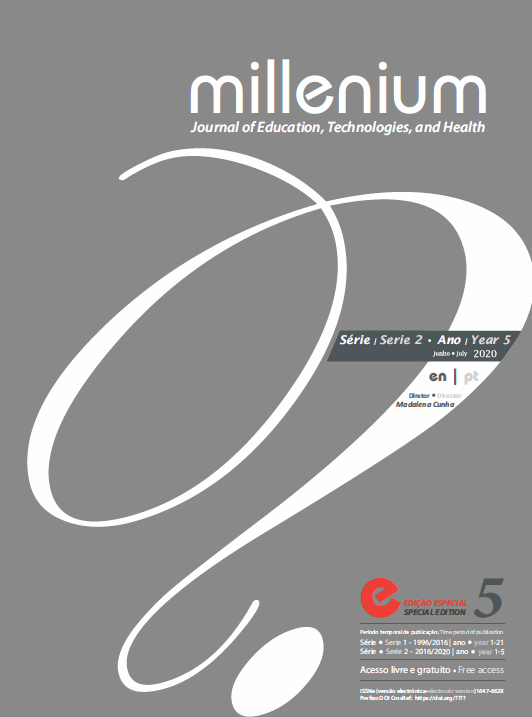A educação inclusiva na formação do assistente social
DOI:
https://doi.org/10.29352/mill0205e.09.00313Palavras-chave:
deficiência, formação profissional, inclusão social, serviço socialResumo
Introdução: Este trabalho apresenta a experiência do curso de graduação em Serviço Social da Universidade Federal do Triângulo Mineiro- (UFTM) em relação à disciplina “Legislações Específicas da Educação Especial”. A disciplina foi incluída na matriz curricular do curso em 2013, visando a formação de profissionais comprometidos com uma prática pautada na abordagem inclusiva e de respeito ao ser humano. Esta necessidade foi identificada a partir da presença de um aluno com deficiência visual no curso de Serviço Social.
Objetivos: Documentar os contributos de uma disciplina na formação académica do assistente social.
Métodos: Foram utilizadas estratégias de aprendizagem, promotoras da reflexão critica no sentido de estimular um compromisso ético e político com práticas profissionais e pessoais inclusivas na interação com a diversidade. O conteúdo trabalhado contemplou aspectos gerais da deficiência, legislações e de políticas para a pessoa com deficiência, além da partilha experiências realização de visitas institucionais.
Resultados: A análise qualitativa da experiência pedagógica revela que a disciplina foi ofertada durante 6 semestres, à cerca 134 alunos, os quais demonstraram compromisso com as atividades propostas. Docentes e discentes avaliaram de forma positiva a disciplina, que proporcionou a aproximação às necessidades da pessoa com deficiência, além de se constituir um espaço para reavaliação crítico-reflexiva da problemática inclusão da pessoa com deficiência
Conclusões: Um desafio para a formação de assistentes sociais é prepará-los para contribuir com o processo de inserção das pessoas com deficiência. Desse modo, a experiência académica com estudantes com deficiência permitiu a ampliação da consciência inclusiva e o acolhimento da diversidade no espaço educacional e profissional, oportunizando assim, o compromisso com a luta/defesa do direito à diferença.
Downloads
Referências
ABESS/CEDEPSS. (1996). Caderno ABESS n. 07. Caderno Especial: Formação Profissional: trajetórias e desafios. São Paulo: Cortez
Brasil, Ministério da Educação, Universidade Federal do Triângulo Mineiro, Curso de Graduação em Serviço Social. (2014).
Projeto político pedagógico do curso de bacharelado em serviço social. Acedido em: http://uftm.edu.br/servicosocial/projeto-pedagogico.
Brasil. (2015). Lei n. 13.146, de 6 de julho de 2015. Institui a Lei Brasileira de Inclusão da Pessoa com Deficiência (Estatuto da Pessoa com Deficiência). Diário Oficial da União. 6 jul 2015.
Ordem dos Advogados do Brasil. (2006). Guia dos direitos das pessoas com deficiência. São Paulo: FIESP/SESI/SENAI/IRS.
Serger, R. G. (2016). As políticas de acesso para estudantes com deficiência nas IES públicas do Estado do Paraná (Dissertação de mestrado). Universidade Federal do Paraná, Curitiba, Brasil.
Downloads
Publicado
Como Citar
Edição
Secção
Licença
Os autores que submetem propostas para esta revista concordam com os seguintes termos:
a) Os artigos são publicados segundo a licença Licença Creative Commons (CC BY 4.0), conformando regime open-access, sem qualquer custo para o autor ou para o leitor;
b) Os autores conservam os direitos de autor e concedem à revista o direito de primeira publicação, permitindo-se a partilha livre do trabalho, desde que seja corretamente atribuída a autoria e publicação inicial nesta revista.
c) Os autores têm autorização para assumir contratos adicionais separadamente, para distribuição não-exclusiva da versão do trabalho publicada nesta revista (ex.: publicar em repositório institucional ou como capítulo de livro), com reconhecimento de autoria e publicação inicial nesta revista.
d) Os autores têm permissão e são estimulados a publicar e distribuir o seu trabalho online (ex.: em repositórios institucionais ou na sua página pessoal) já que isso pode gerar alterações produtivas, bem como aumentar o impacto e a citação do trabalho publica
Documentos necessários à submissão
Template do artigo (formato editável)





